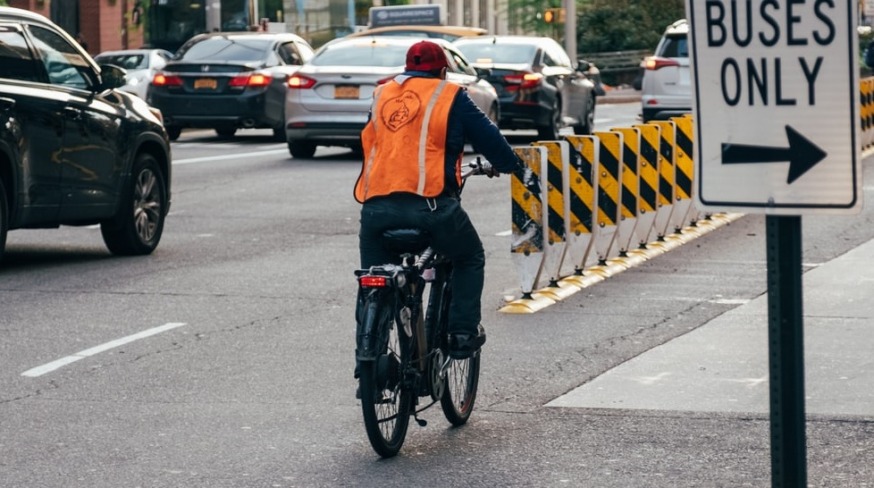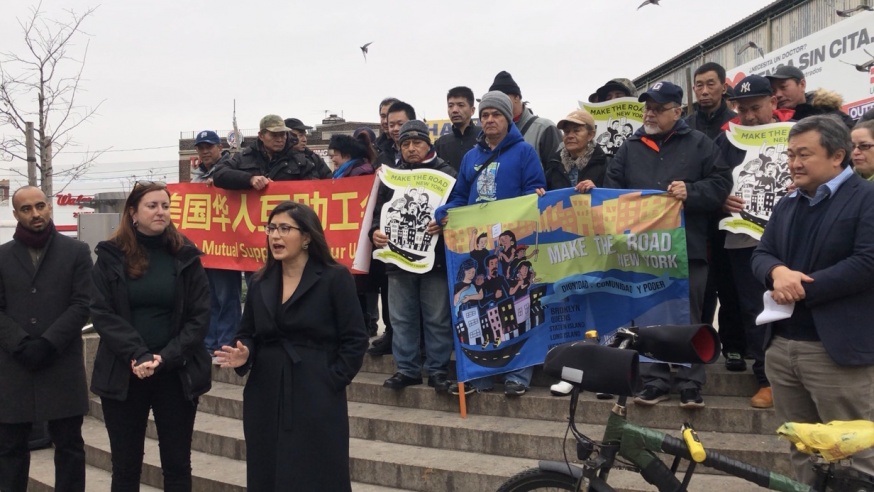
Photo: Stock Unsplash
April 2, 2020 By Christian Murray
The New York State legislature reached a budget agreement yesterday that includes a provision that will legalize the operation of most e-bicycles and e-scooters.
The new legislation is similar to what State Sen. Jessica Ramos and Assembly Member Nily Rozic championed in 2019 that Governor Andrew Cuomo did not sign.
The pair, who sponsored and passed legislation through their respective chambers last year, represent areas where there are many immigrant food delivery workers who ride e-bikes and e-scooters that are currently banned. Ramos and Rozic say that many of these low-paid workers have been unfairly hit with $500 fines and had their bikes confiscated.
The legislation essentially legalizes e-bikes with a top speed of 25 miles per hour and e-scooters with a maximum speed of 15 miles per hour. It will automatically apply to all municipalities when it is signed into law, although local jurisdictions will be able to pass local laws that can still ban their use.
The new state legislation will not have much of a bearing on the current rules in New York City, since a local law passed in 2004 prohibits the use of throttle-powered e-bikes and e-scooters, according to Marco Conner DiAquoi, deputy director at Transportation Alternatives.
Conner DiAquoi said that the 2004 city law needs to be repealed. However, he said he is confident that the City Council will pass legislation repealing that law—given the fact that Council Speaker Corey Johnson and many others are in favor of doing so.
The city has been hesitant to change the rules as it wanted clarity from the state. Some have argued that the city couldn’t change the law without the state clearing the way.
“Our goal has been to provide overdue clarity in the law to deliver economic justice for delivery workers and introducing safe, new transit options,” Ramos and Rozic wrote in a joint statement.
The rules governing e-bikes and e-scooters have been murky for some time. In New York City, most pedal-assisted e-bikes are currently legal but throttle-powered e-bikes and scooters are not.
The NYPD, with Mayor Bill de Blasio’s backing, has been confiscating throttle-powered e-bikes—popular among delivery workers– and ticketing workers riding them. The City Council is expected to now take up the issue.
However, advocates for the repeal of the 2004 law are unsure whether de Blasio will join forces with the City Council to overturn it–given his past crackdown on e-bikes and e-bike riders.
The state legislation, which is technical and has the Cuomo’s backing, classifies e-bikes into three categories, each subject to its own requirements. Additionally, e-scooters are subject to their own set of rules. The legislation expressly bans e-scooter share programs in Manhattan.
There are three classes of e-bikes as determined by the state legislation.
Class 1—which are pedal-assist bikes that have a top speed of 20 miles per hour. These bikes have already been approved by NYC and Citi Bike offers them.
Class 2—throttle-powered e-bikes with a maximum speed of 20 miles per hour
Class 3—throttle-powered e-bikes with a maximum speed of 25 miles per hour—for cities with one-million people or more.
The legislation also carves out the requirements for e-scooters, which are to be capped at 15 miles per hour.
The new law requires adult riders of Class 3 e-bikes to wear a helmet—but not with the other two classifications of e-bikes or with e-scooters. Meanwhile, younger riders must wear helmets on all e-bike classifications and e-scooters.
The legislation will also see e-bike riders who get into crashes while intoxicated being fined up to $500 or 15 days in jail.
“Transportation Alternatives applauds Governor Cuomo and the state legislature for including the legalization of e-bikes and e-scooters in the state legislation,” Conner DiAquoi said. “This budget provides a long overdue legal framework for e-bikes in New York, while allowing New York City to regulate their use further to meet local needs.”

State Sen. Jessica Ramos and Assembly Member Nily Rozic called on Governor Cuomo to sign legislation to legalize e-bikes and e-scooters at a rally in Corona Plaza in December. Similar legislation is part of the state budget (Sen. Jessica Ramos Office)






